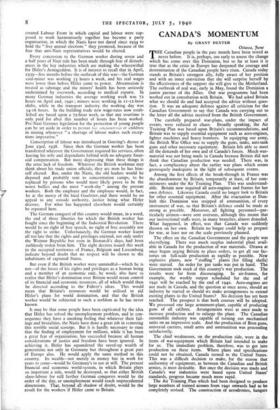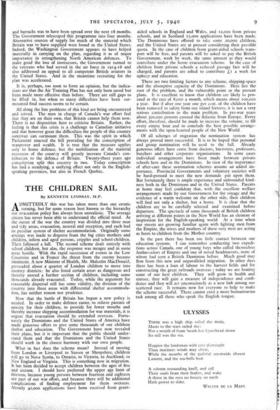CANADA'S MOMENTUM
By GRANT DEXTER
Ottawa, lune Fr FIE Canadian people in the past month have been tested as never before. It is, perhaps, too early to assess the change which has come over this Dominion, but so far at least it is true that as the crisis in Europe has deepened the courage and determination of the Canadian people have risen. Canada today stands as Britain's strongest ally, fully aware of her position and with an inner conviction that she will surprise herself by the effectiveness of the support she will give to the Motherland. The outbreak of real war, early in May, found the Dominion a junior partner of the Allies. Out war programme had been worked out in consultation with Britain. We had asked Britain what we should do and had accepted the advice without ques- tion. It was an adequate defence against all criticism for the Canadian Government to say that Canada was carrying out to the letter all the advice received from the British Government. The carefully prepared war-plans, under the impact of events, were reduced to chaos. Broadly speaking, the Air Training Plan was based upon Britain's recommendations, and Britain was to supply essential equipment such as aero-engines, fighter machines and heavy bombers. In equipping our army, the British War Office was to supply the guns, tanks, anti-tank guns and other necessary equipment. Britain felt able to meet all the demands of her own and of Canada's forces. Much war- material was not being made in Canada because Britain did not think that Canadian production was needed. There was, in fact, a complacency about the earlier war plans which seems grotesquely inadequate in the light of subsequent events.
Among the first effects of the break-through in France was the abandonment by Britain, temporarily at least, of her com- mitments under the Air Training Plan. This was understand- able. Britain now required all aero-engines and frames for her own defence. Likewise Canada could no longer look to Britain for other essential equipment. After the evacuation at Dun- kirk this Dominion was stripped of ammunition, of every instrument of war, so that Britain's defence could be made as strong as possible. Moreover, all fighting personnel—par- ticularly airmen—were sent overseas, although this meant that our instructional staffs were, in many branches, almost denuded. What happened, in effect, was that Canada was suddenly thrown on her own. Britain no longer could help us prepare for war, at least not on the scale previously planned.
The effect on the Canadian Government and the people was electrifying. There was much surplus industrial plant avail- able in Canada for the production of war materials. Ottawa at once began urging Britain to place orders, to get all our fac- tories on full-scale production as rapidly as possible. New explosive plants, new " stuffing " plants (for filling shells) were started. An order for 300 tanks was put in hand. The Government took stock of this country's war production. The results were far from discouraging. In air-frames, for example, the weekly output scheduled for the end of i941 will be reached by the end of 1940. Aero-engines are not made in Canada, and the question at once arose, should an industry be started or should we make arrangements to extend existing plants in the United States? No decision has yet been reached. The prospect is that both courses will be adopted. We possessed one large armament-plant, capable of producing guns of all calibres. Arrangements were at once made to increase production and to enlarge the plant. The Canadian automobile industry was capable of turning out mechanised units on an impressive scale. And the production of Bren guns, universal carriers, small arms and ammunition was proceeding satisfactorily.
The chief weaknesses, on the production side, were in the items of war-equipment which Britain had intended to make for us. The immediate problem, therefore, was to get into production on these items. Where plans and specifications could not be obtained, Canada turned to the United States. This was a difficult decision to make, for the reason that uniformity of equipment, as between the Canadian and British armies, is most desirable. But once the decision was made and Canada's war industries were based upon United States' standards, progress became much more !arid. The Air Training Plan which had been designed to produce large numbers of trained airmen from is' caiwards bad to be completely revised. The construction of aerodromes, hangars and barracks was to have been spread over the next 18 months. The Government telescoped this programme into four months. Alternative sources of supply for much of the material which Britain was to have supplied were found in the United States. Indeed, the Washington Government appears to have helped materially in carrying on the plan, _regarding it as of major importance in strengthening North American defences. To make good the loss of instructors, the Government turned to the veterans who had served in the air force in 1914-18 and also addressed an appeal to all competent British aviators in the United States. And in the meantime recruiting for the plan was accelerated.
It is, perhaps, too soon to form an opinion, but the indica- tions are that the Air Training Plan has not only been saved but been made more effective than before. There are still gaps to be filled in, but when so many difficulties have been sur- mounted final success seems to be certain.
All along the line problems of this kind are being encountered and solved. The men in charge of Canada's war effort feel that they are on their own, that Britain cannot help them now. There is no disposition here to criticise Britain. Rather, the feeling is that this crisis is a challenge to Canadian initiative and that however great the difficulties the people of this country someway can surmount them. This was the spirit in which Parliament enacted the bill providing for the conscription of manpower and wealth. It is true that the measure applies only to home defence, but the mobilisation of the material resources of the county will greatly increase Canada's con- tribution to the defeme of Britain. Twenty-three years ago conscription split this country in two. Today conscription has had a steadying, a unifying effect not only in the English- speaking provinces, but also in French Quebec.































 Previous page
Previous page